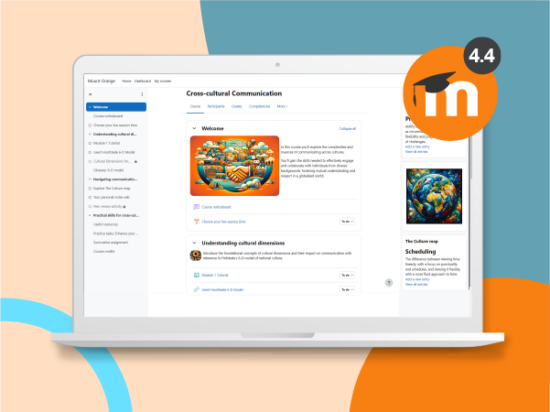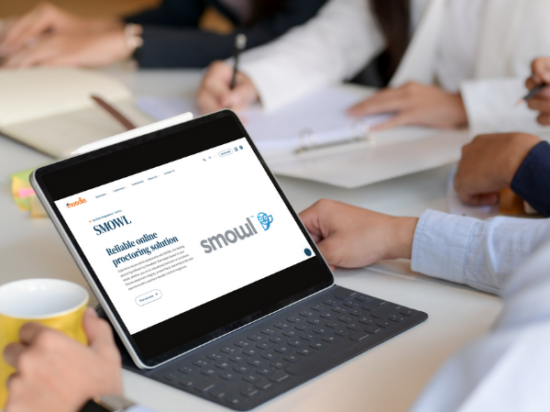Navigating the complex world of educational technology, it’s clear that Moodle stands out as a platform deeply rooted in social learning theory and social constructionist pedagogy. Built on these age-old tenets, Moodle is a robust Learning Management System (LMS) that captures the essence of these frameworks. As the educational and employee training field evolves, so should our strategies for fostering learning environments that are not just collaborative but also deeply engaging.
Interaction and engagement remain cornerstone elements in any successful learning experience, acting as a bridge between traditional social learning theories and modern pedagogical practices. These facets are not new; they echo the principles laid down by social learning theory and social constructionist pedagogy. In this blog post, we will uncover more about the foundations of social learning and how to effectively implement social learning experiences with Moodle.
What is social learning?
Before diving into the specifics of implementing social learning experiences in Moodle, it’s crucial to understand what social learning actually entails. At its core, the theory posits that individuals acquire knowledge and skills through interaction with others, be it through observation, imitation, or discussion.
This aligns with the principles of social constructionist pedagogy, which emphasises that learning is a shared journey, one that is moulded and influenced by the learner’s social interactions and experiences.
Social learning is not a new phenomenon, it’s as old as human society itself. However, the digital age has brought new opportunities and challenges for incorporating social learning into online educational systems. In this context, the concept becomes more than a theoretical construct; it’s a practical necessity for fostering rich, interactive educational experiences.
Whether students or learners are collaborating on a project in real-time or engaging in discussion forums at their own pace, the objective remains the same: to create a dynamic learning environment that taps into the social and collaborative aspects of human nature, thus enriching the educational experience.
With this foundational understanding, we can delve into practical strategies for effectively incorporating social learning in Moodle to enhance both interaction and engagement.
How to embrace social learning with Moodle
Moodle LMS is the ultimate embodiment of the values that bring together our community of developers, system administrators, educators, and learners. As we already mentioned, Moodle is based on social constructionism, which is the understanding that people construct knowledge within a social context. The platform supports and advocates for the importance of creating a collaborative learning community where learners acquire knowledge “by doing” and by observing their peers. It’s a community where educators understand the context of their learners, allowing them to tailor the language and expression of concepts to best fit their audience. It’s also where tutors see themselves as learners, open to collaboration, listening, and sharing ideas to enhance their understanding and, in turn, make improvements to the learning program.
Moodle offers various features that support social learning, such as forums, wikis, and collaborative assignments, providing opportunities for learners to engage with the course material and each other in a meaningful way.
Offering learners different ways to express themselves can significantly enhance the social learning experience. Whether it’s through text, video, or interactive simulations, Moodle’s rich array of tools supports diverse mediums of expression. This not only caters to different learning preferences but also invites varied perspectives into the learning environment, enriching the collective understanding of the subject matter.
Moodle also supports both asynchronous and synchronous content delivery modes, accommodating different learning preferences and enhancing the learner experience through interaction with peers and teachers. Synchronous learning experiences, such as live meetings and virtual classrooms, offer immediate interaction and can quickly build a sense of community. On the other hand, asynchronous learning accommodates learners who wish to engage with the material at their own pace, providing them the space to reflect and contribute thoughtfully. There’s an ongoing debate on the efficacy of one of the models versus the other. The beauty of Moodle lies in its flexibility to offer both. This dual approach not only aligns well with the theory of social constructivism but also accommodates diverse learning preferences. Whether it’s a live discussion or a forum post, the avenues for social learning in Moodle are abundant.
Furthermore, the platform provides learners with multiple means of engagement and presents educators with alternative ways to recruit learner interest. Implementing different strategies in this domain and sustaining effort and persistence are key to effective social learning. Examples include using real-world problems for assignments, incorporating elements of choice, and leveraging gamification techniques, which can heighten engagement and encourage peer-to-peer interaction. Similarly, providing regular, constructive feedback, creating opportunities for peer review, and setting achievable, incremental goals can help sustain learner effort and persistence.
The LMS allows educators and trainers to implement these strategies through its diverse range of features, from badges and leaderboards to peer assessment and interactive activities.
In addition to the platform itself, Moodle offers feature-rich plugins that support social learning like the Board, a plugin that has been developed and maintained by Brickfield Education Labs. The Board module for Moodle is a plugin that enables a “post-it” board activity for students, a collaborative activity where the teachers set out a number of columns with optional names and then students add contributions to a column. Students are not able to see who has posted the note. On the Board, students can add a new post with a heading, some text, a link, upload an image, embed a YouTube video, edit or delete one of their posts. Learn more about the plugin by visiting the Board plugin page.
Conclusion
By considering the foundations of social learning and the rich capabilities of LMS platforms like Moodle, educators and trainers can effectively incorporate a social learning model into their course design. Its comprehensive set of features, a solid grounding in social learning theory, well-thought-out development plans, and robust community support, can be of immense benefit to your learning institution and your learners.



